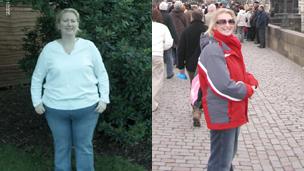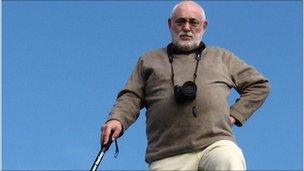Weight-loss operations: Your stories
- Published
The number of obese people in England having operations to lose weight on the NHS has risen tenfold in less than a decade.
The British Medical Journal reports operations such as gastric banding and bypasses rose from 238 a year to more than 2,543 in 2007.
BBC News website readers have been sharing their weight-loss stories.
Joanne Hall, Ilkestone, Derbyshire
I am all for weight-loss surgery. I had a gastric band fitted on the NHS in March 2008, and have lost 12-and-a-half-stone in 16 months.
It's not the easy route. I worked really hard to get the results and I still had to watch what I eat, and eat well.
I felt it was my last chance - if the surgery did not work for me, that was it.
I was worried about my health and I wanted to be around to see my grandchildren.
I was constantly tired so I knew it was time to do something.
It was a strange feeling at first with the band. It's like an iron fist - you know when you've had enough to eat because the pain gets too much.
There's a great weight on your chest because the band is just behind your heart.
John Parish, Cambridgeshire

"I had no real social life as I always felt too ill"
I had a gastric bypass on the NHS about 14 months ago.
When I was referred I had diabetes, which was insulin-controlled, and heart problems.
I was 29-and-a-half stone. I felt trapped in a never-ending cycle - most of my time was at hospitals or the doctor.
I had no real social life as I always felt too ill. It took about 18 months from first consultation to having the operation in which time I had managed to lose three stone.
I've now lost 10 stone and am no longer on insulin or any diabetes drugs, it's solely diet controlled now.
Now I can do more. It's coming slowly, as the result of years of being overweight don't just disappear.
It's definitely not a simple option - it requires a life-long commitment and sacrifice.
Unlike dieting, which you can stop and go back to after a period of time, this option is 24 hours a day for life.
Claire Jacobsen, West Yorkshire

"I fought long and hard for this surgery"
I was one of those lucky few in 2005 to receive gastric bypass surgery on the NHS. I was 28-and-a-half stone, aged 32, and I am now 14 stone. I dropped from a size 32 to an 18/20.
I fought long and hard for this surgery after losing seven stone with WeightWatchers to aid my plight.
I had to go through hell and high water for more than 12 months to qualify for surgery funded through the NHS.
Tests after tests, alternatives to surgery to help me lose weight prior to surgery, I endured psychological tests and an agonising wait.
Now my life has transformed I am a happy, healthy 37-year-old with a lot to look forward to, especially life itself.
My heartfelt sympathies go out to everyone with this agonising battle and wait on their hands for this precious life-saving surgery.
It is most definitely not the easy way out of losing weight naturally.
Neil Avison, Grimsby
On 10 May 2010 I had a gastric sleeve fitted on the NHS. It all started two years ago when I had a ruptured appendix that went gangrenous.
I ended up having two operations in five days and had 50 staples in my belly.
I have an 18-year-old disabled son so years of lifting him had also caused a hernia. After several attempts to repair this I was eventually referred to a consultant in Hull who performed the surgery on medical terms.
Before my appendix burst I was 14 stone, but then I started putting on weight. I went up to 20st 8lb when I had the surgery, now I'm back to 16 stone.
The surgery was straight forward. I went in on the Monday morning and was home by Wednesday.
It was done by keyhole and was totally pain-free. It's totally changed my life and I'm still losing around 3lb a day.
Bob Mason, Wakefiled

"My surgery went horribly wrong"
My wife and I both had gastric surgery. My wife lost 12 stone, going from size 32+ to size 10. Twelve years on she has kept the weight off and looks great.
My surgery in 2001 went horribly wrong. I ended up with a hernia which my stomach went into. Then my stomach went into my chest cavity and was pushed next to my heart.
It was excruciatingly painful but after three years of hell I had the surgery redone to move the remains of my stomach from my chest back into my abdomen.
Now I have a monthly injection that costs £555 just to be able to eat normally.
However, nine years on I am six stone lighter and able to walk again.
I wouldn't have it done again. I'd recommend it to others as long as the patient fully accepts the massive risk they are taking, is fully informed about what can go wrong and has been fully briefed about the huge lifestyle change they need to make for bariatric surgery to be successful.
Sally Poole, Manchester

"The fertility doctor referred me for a bypass."
I had gastric bypass surgery in 2007 when I was 23. I was 21 stone at my heaviest, and a size 28. I was relatively healthy except for being morbidly obese. I wanted IVF treatment but the fertility doctor referred me for a bypass instead.
I had my operation at the beginning of May 2009 and it took 12 months to drop the 10 stone. I am now four months pregnant with my first child.
The NHS saved money on IVF treatment for me as well as long term health problems associated with being morbidly obese.
I am currently 11 stone 4 and a size 12/14 but as I said I am pregnant so my weight is going up.
I have been told I am the odd one out as I was happy being bigger and I didn't have any illnesses associated with obesity.
I run an online support group on Facebook for the Manchester area and have 157 members just from Manchester who have had, or are waiting to have the operation on NHS or privately.
Other comments
I had a gastric band fitted last year, and am currently three-and-a-half stone down. It was a total success but it is really hard to get your head around it - there are psychological issues tied in with it. It is certainly not the easy way out. I have a low metabolic rate so in order to lose weight by "conventional" methods, I would have to be eating around 900 calories a day and exercising hard every single day - it isn't viable when taking into account my starting weight. It has been incredibly difficult and I've had to learn portion control because if I eat too much it hurts a lot. You have to learn to listen to your body and you get to know when you're full. Mindy, Berkshire
Why should these operations be paid for by the NHS? Unless weight issues are caused by a medical problem, people should stick to traditional methods of exercise and better eating. I was obese, and I have lost a lot of weight through diet and exercise. I never once contemplated that I should have surgery as I knew my weight was caused by my diet. Kizzy, Wiltshire
Surgery is now seen as the easy way out. The NHS has made this surgery too accessible, thus it has become the quick fix and minimal effort option. People can say that surgery is the only option as they have a low metabolism and whatever they do never works. In my opinion this is them just kidding themselves. I've been there. I weighed 18 stone and always used the excuse that it was my metabolism and just the way my body worked. Nevertheless, I managed to lose seven stone through changing my whole lifestyle. Matthew Plampton, Epping
I manage a bariatric surgery service and feel there is a real need to inform the British public about the truth behind this type of surgery. It is not an "easy way out" as often labelled; many patients will never be able to eat a normal meal again. It is also not a waste of NHS funds. In fact it offers massive potential savings. Treating the conditions associated with obesity (diabetes, hypertension, sleep apnoea, orthopaedic procedures to excessive pressure on joints, to name but a few) is a huge cost to the NHS, particularly as many of these conditions will need treating for the remainder of the patient's life. Bariatric Surgery procedures by comparison cost thousands of pounds less, and increase both life expectancy and quality of life. K Jones, London
My heart goes out to people with weight problems. Their condition is misunderstood and often subject to ridicule by the intolerant and uneducated. I lost eight stone through dieting five years ago and dropped from 20 stones to 12 stones, but I am aware of how desperate it can feel to be so overweight, and how difficult it is to keep the weight off once lost. Thankfully I have done so, but it is still something I have to work on every day to stop it creeping back on. I am glad that all is being done to help these people but I worry about the cost to the taxpayer. Duncan Cleverley, Hastings, East Sussex
- Published27 August 2010